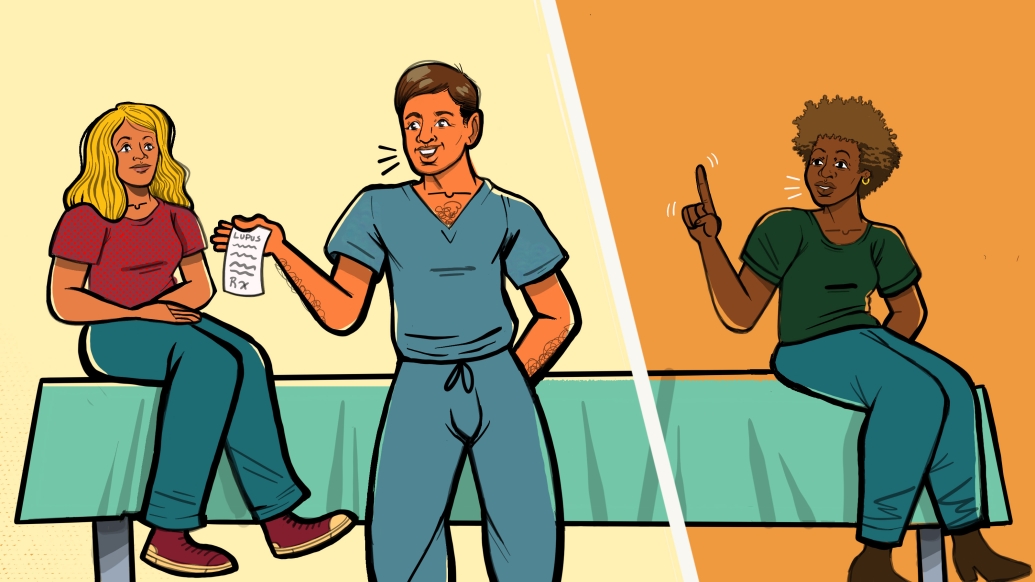Despite being one of the highest lupus populations, Black adults are often left behind. A rheumatologist discusses ways to improve the issue
5:00 AM
Author |

Receiving a lupus diagnosis can be a long and frustrating journey.
For Black adults, this already difficult process is usually even more drawn out, and comes with its own types of challenges.
Sadly, racial inequities are a defining feature in the treatment of Black adults with lupus.
On average, diagnosis comes later (and for many, it’s after having their concerns dismissed), and the severity of symptoms, and risk of death, are also increased.
“Many Black people are discouraged when it comes to their lupus diagnosis because they are not seen as being in enough pain or having enough symptoms,” said Rachel Bergmans, M.P.H., Ph.D., a research investigator at the University of Michigan Department of Anesthesiology and lead author of a study describing opportunities to improve care for Black adults with lupus published in JAMA Network Open.
“This treatment can cause people to feel that their experiences are not valid and can deter them from seeking the help they need.”
Bergmans and her fellow researchers found that not only were Black people with lupus feeling discouraged about seeing a doctor, for fear of their symptoms not being validated, but many were skipping medications due to negative side effects or high costs.
“Close monitoring of the symptoms not only from lupus but also from the medications people are receiving is crucial to making sure there’s success in treatment,” said Bergmans.
“Sometimes side effects of different medications are not shared in the context of the person’s lupus so they aren’t aware of why they might be having negative side effects or when to talk to a doctor about these side effects.
Lupus: A frustrating diagnosis journey you don’t need to embark alone
“Educating patients on all aspects of the medication and treatment they are receiving and when they should be concerned about side effects is an important part of treating the whole person when it comes to lupus.”
Creating more awareness for diagnosis
According to Michelle Kahlenberg, M.D., Ph.D., a professor of rheumatology at University of Michigan Health and co-author of the study, the first step to combating some of these disparities is by raising awareness about the various ways symptoms of lupus can present to non-rheumatologists, helping improve the diagnosis process, thus creating more referrals.
“It is critical to open a dialogue between patients and their health care team to properly build trust,” said Kahlenberg.
“We need to meet patients where they are in terms of understanding their disease, their previous health care experiences, and the difficulties they face in accessing proper treatment. If we don’t understand these aspects of care, we will miss opportunities to bring them to the best health possible.”
When it comes to perseverance through this frustrating diagnosis period, Bergmans suggests using community resources to help find strength.
“Discussing experiences with other lupus warriors who have gone through the same process can help people feel validated in their journey and frustrations,” said Bergmans.
“Using a site such as Conquer Lupus to hear the stories of those who have lupus can give validation to the challenges of having lupus.”
The website also includes information about managing lupus symptoms.
Additional authors include Rachel S. Bergmans, Ph.D., Bhaavna Yalavarthi, Johari Summerville, Nikki Farahani, Lillian Z. Xaio, Christine Yu, Deena Aboul-Hassan, Sia Rajgarhia, Daniel J. Clauw, M.D., from the Medical School, Department of Anesthesiology, University of Michigan, Ann Arbor, Michigan, USA. Michelle Kahllenberg, M.D., Ph.D., from the Medical School, Department of Internal Medicine, University of Michigan, Ann Arbor, Michigan, USA. Melissa DeJonckheere, Ph.D., from the Medical School, Department of Family Medicine, University of Michigan, Ann Arbor, Michigan, USA.
Funding: This work was supported by the US National Institute of Arthritis and Musculoskeletal and Skin Diseases of the National Institutes of Health under grant T32-AR07080 (R.S.B.).
Disclosures: Dr Kahlenberg reported receiving grants from Bristol Myers Squibb and Janssen; grants and personal fees from ROME Therapeutics and Ventus Therapeutics; and personal fees from AstraZeneca, Gilead, Exo Therapeutics, Lupus Therapeutics, GlaxoSmithKline, and EMD Serano outside the submitted work. Dr Bergmans reported receiving personal fees from Tonix Pharmaceuticals Inc for consulting outside the submitted work. No other disclosures were reported.
Paper cited: “Recommendations for Improving Systemic Lupus Erythematosus Care From Black Adults,” JAMA Network Open. DOI: 10.1001/jamanetworkopen.2023.40688

Explore a variety of healthcare news & stories by visiting the Health Lab home page for more articles.

Department of Communication at Michigan Medicine
Want top health & research news weekly? Sign up for Health Lab’s newsletters today!





